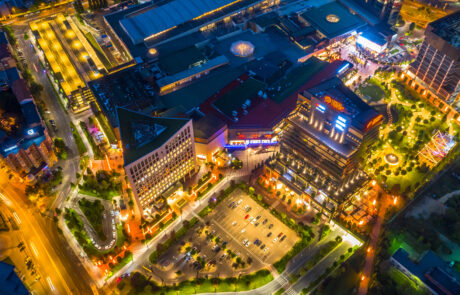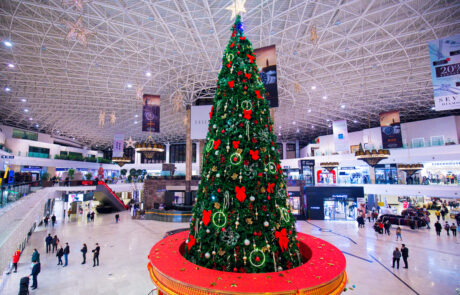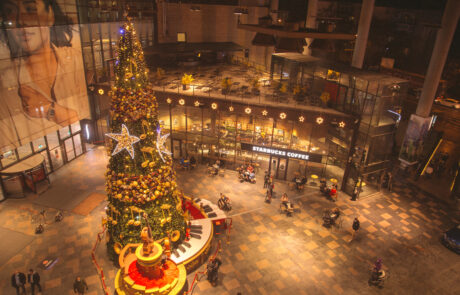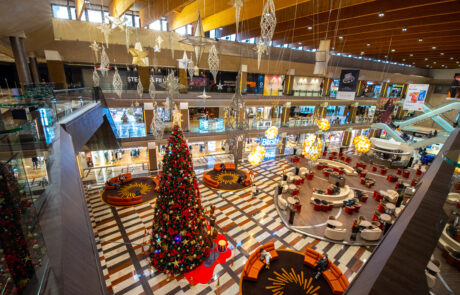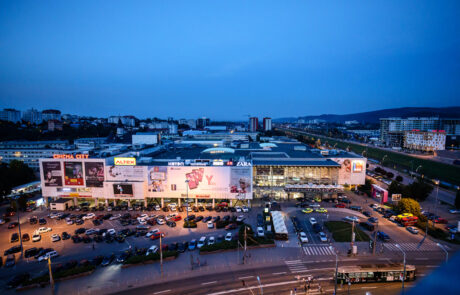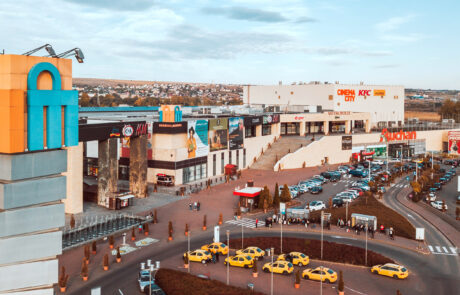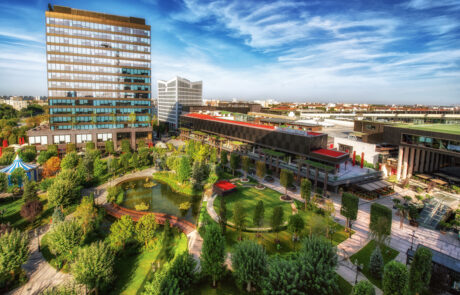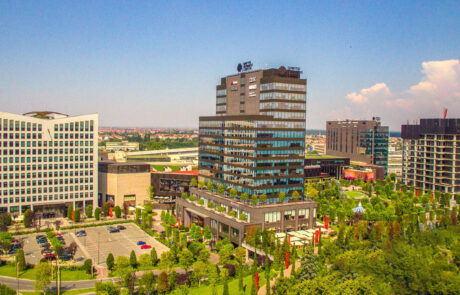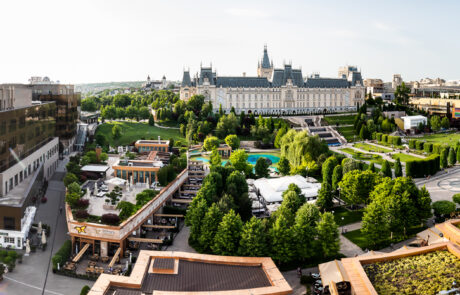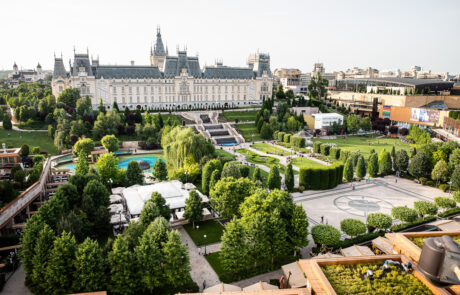Covid-19 – a Romanian perspective
The impact of Covid-19 on trade has been felt throughout the territories where Atterbury Europe operates, but each country had its own, unique way of dealing with the challenges. Sebastian Mahu, Head of Asset Management at our Romanian partners IULIUS, looks back over an unprecedented year.
What were the priorities on your plate at the start of the global lockdown, and what was your strategy going into this unusual situation?
First and foremost, our concern was to identify and implement optimal safety measures for all segments of our public – retailers, other businesses and all their employees and clients. This was no easy feat, particularly as the demand on the market exceeded the existing offer, but also because the whole context was unprecedented, uncertain and constantly escalating.
We took proactive steps for the entire retail portfolio of IULIUS Company (mixed-use projects Iulius Town Timișoara and Palas Iași, as well as the nationwide Iulius Mall network operating in Iași, Cluj-Napoca and Suceava) and implemented a comprehensive package of 40-plus measures as early as the first signals of the emerging health crisis. These measures were based on a complex analysis of the international retail market, authorised and specialised recommendations, as well as the know-how of the management team. In brief, the new measures focused on all the aspects of operational activity, from reorganising the commercial flows to air quality, implementing an online tracking system, intensifying the cleaning operations and enforcing physical distancing rules. Basically, for the first time ever, visitor safety and health had become our only priority and we had to reinvent ourselves to ensure the psychological and physical comfort of our circumspect and fearful clients, and to reassure them that they are in very safe spaces.
The pandemic has also set new rules that we had to address via effective solutions, to optimise our activity and find avenues to support our partners. Therefore, constantly communicating with our 1000-plus retail partners has also become a priority, in order to identify working schemes that support their activity. Evidently, crisis situations also entail compromises and a negative impact, which we assumed without hesitation. We believe that it was precisely our support in terms of costs and strategies that made it possible now, after nine months of crisis, to have a low impact on our tenant portfolio and a vacancy rate of 1.4% in the five retail projects we operate.
What did you see as your biggest challenge, and how was that handled?
This year has completely rewritten the rules of retail and caused consumers to become more selective and reserved, and to have additional expectations. Aside from 2020’s shock factor from every point of view, it has also tested our adaptability to the maximum, accelerating trends and tendencies that were set to roll out in the course of several years. Now everything was focused in a matter of months. As a result, we began to innovate and to find new systems that offer added value, such as the delivery system, pick & collect points, premises for logistics and easy access to courier services, which would allow tenants to carry out their activity even under specific restrictions.
The speed of reaction and flexibility that have repeatedly reset our activity, including that of operators, were constant challenges. All the more given that, subject to the pressure of the restrictions mandated by the authorities, the poorer financial resources, the deep social and medical crisis, as well as some discouraging international signals, we had to set up new ways of working so as to stay connected and relevant on the market.
The new reality continues to be rough and the great challenge remains being able to adapt the status quo built over the last 10 to 20 years, in a market removed from its comfort zone and undergoing major changes in terms of behaviour and consumption. In brief, managing change has been the main challenge, and we believe it will continue to be, perhaps even more so, in 2021.
Fortunately, our projects are based on mixed-use concepts, integrating retail, office, park, services and entertainment components, and providing magnetic urban and social landmarks, which helped them maintain their attractiveness for the community. Moreover, as they are centered around generous gardens, our projects have transformed into platforms for social interaction and cultural events during the warm season, managing to provide people with the ideal venue to satisfy their need to escape in nature, but in perfect safety. The fact that these are visionary projects that provide all the necessary services for a high level of quality of life, all in a single location, has demonstrated their capacity to be flexible and easily adapt to the new context.
What is the status in Romania as of now in terms of restrictions and how is that impacting currently on trading? How are you managing that?
For the moment, retail activities are subject to the impact of restrictions calibrated according to infection rates in various areas of the country. The cities where we operate, namely Iași, Timișoara, Cluj-Napoca and Suceava, are under ongoing red scenarios, prohibiting activities in the indoor food-and-beverages segment, movie theatres, and so on. These categories were the most deeply affected and we’re working together to identify solutions to adjust the impact, in compliance with the decisions of authorities, so they can remain present on the market. Right now, in the food-and-beverages category, IULIUS Group is shouldering all of the pressure caused by these restrictions so as to help this segment overcome this period. Even with the help we are able to provide, we still need additional support in the form of matter-of-fact measures for mitigating the financial impact, as well as resilience.
What does “business as usual” look like right now for you?
This year was not at all what we expected it to be, but we can say we have now managed to find a balance between all the entities engaged in the retail market mechanism (investors, financers, tenants, consumers). However, the evolution of the pandemic threatens to impact this balance.
In a word, our current activity is fluctuating. As far as visitor footfall is concerned, it has followed a curve defined by the periods of restriction and the escalation of the social and medical crisis, with decreases between 7 and 35%. In all our projects, the decrease in traffic is balanced out by the marked increase in terms of store visit conversion rates, an indicator that shows us the focus towards purchasing. Even so, we must note that many of the tenants have made substantial efforts, rolling out sales campaigns that have decreased their markup. For similar sales, compared to 2019, the retailers’ profitability has decreased by as much as 75%.
For certain retail categories, such as sport, home and décor, and jewellery, there have been increases by as much as 20%. However, as mentioned before, for the food-and-beverages segment the negative impact is in some cases as high as 100%.
Our entire operating activity is now geared towards sustaining the activity and identifying new opportunities and mechanisms to adapt, as well as instruments that will provide us with the leverage to overcome new challenges. We are bracing for a first quarter of 2021 that will be very difficult for the entire industry. It is clear that certain businesses, particularly local ones, will be unable to survive another quarter that was generally deemed the slowest of the year. I believe substantial support is necessary, not only from landlords, but also from the authorities.
Later on, we expect a mild rebound in Q2 and Q3, in the context of a low impact of the medical situation generated by the pandemic, and we estimate that in Q4-2021 sales will bounce back to Q4-2019 levels.
The cliché says that for every challenge there is an opportunity. What would you say is the one key learning that you and your team have taken away from this unusual year? If you could step back to the beginning of 2020, knowing what you know now, would you have done anything differently over the last 10 or so months?
The pandemic proved there is no business recipe one can apply when the challenges are unexpected, and the context suddenly changes. The experience, creativity and analytical thinking lead to identifying the suitable approach. This year broke all of us out of our routine and forced us to act, to innovate, to work together and to help one another.
This is certainly a turning point for all humankind, and I hope that once the crisis passes we will be left with answers and tools to help us do better in the future.
Had we already had the experience of these past months, I do believe we would have accelerated projects and platforms designed to provide multichannel experiences, so as to have some backup for the three-month period when the retail activity was suspended almost entirely.

